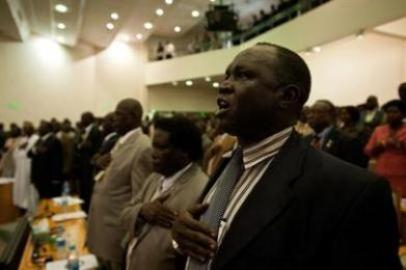S. Sudan parliament delays passing of security bills
September 29, 2014 (JUBA) – South Sudan national assembly delayed on Monday the passing of a bill meant to govern work of National Intelligence and Security Service (NISS) to allow observations made by lawmakers inserted into the draft document.

Duwar described the security bill as an important national interest legislation.
Paul Mayom Akech, an MP from Lakes state and a member of security committee in the parliament, said the bill clearly defines the powers of the NISS officers and citizens’ rights and liberties.
Akech said section 50 of the draft bill allows security officers to arrest suspects without arrest warrant provided that such directives came from the minister or director, something he willingly supported.
“The rights of the detainee have been well articulated in [section] fifty-one,” he said, adding that detainees should be made aware of the charges within 24 hours.
However, when speaker Manasse Magok Rundial asked MPs for a yes or no response in favour of or against the bill, many of the lawmakers opted for the latter.
Grace Abala, a lawmaker from Eastern Equatoria state, said the security committee failed to include recommendations made during the second reading to the bills.
“For example, the issue of [security] officers complaining to their bosses should have been removed and replaced with formation of an independent commission to handle inquiries,” she said.
“How can you complain to your boss about your boss? It cannot work,” Abala told parliament.
Philip Thon Leek, an MP from Jonglei state, said the significance of the bill does not exempt it from parliamentary scrutiny.
Leek said misuse of the law due to poor understanding of it could be a challenge.
“We have the experience of what used to happen in Khartoum when the security apparatus in Khartoum used to misinterpret the law and they actually see the citizens as the enemy. The ordinary citizens should not be seen as enemy. These are the people being protected,” said Leek, also a former governor of Jonglei state.
“If you are to do [implement] this law, these people must be literate. And therefore, that item is not included in section 30; ‘legibility for recruiting members.’ It does not include the standard of education. I feel that this law must be implemented by people who can write and read,” he said, winning applaud from MPs.
Onyoti Adigo, leader of the minority in the parliament and SPLM-DC representative, said there were many issues needed to be corrected before the eventual passing of the bill.
ACTIVISTS REACT TO BILL
A South Sudanese civil society entity has backed MPs’ decision not to pass the NISS.
“Security [matters] request full citizens participation. Law usually enacted in a manner that is not transparent and undemocratic always it backfires,” Community Empowerment for Progress Organisation (CEPO) said in a statement to Sudan Tribune on Tuesday.
“CEPO would like to thank MPs for demonstrating that we rightly voted for them. Preventing exclusive enactment of legislation is one of the reasons why we voted for you,” it added.
(ST)
